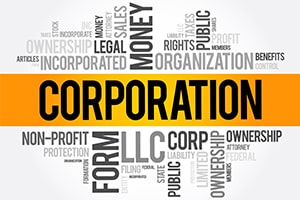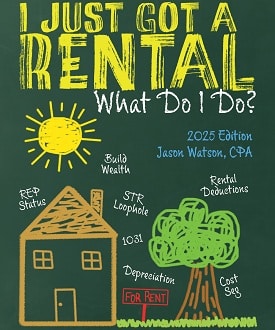-
I Just Got a Rental, What Do I Do?
-
- Chapter 1 Introduction
- Real Estate and Rental Properties as a Business
- Basic Business Entities For Real Estate Investment
- Sole Proprietorship
- Single-Member Limited Liability Company (SMLLC)
- LLC Benefits For Rental Properties
- Multi-Member Limited Liability Company (MMLLC)
- Limited Liability Partnerships (LLP) and General Partnerships (GP)
- Benefits of Rental Property In Partnership Entities
- Summary Of Rental Properties In Partnerships
- Downsides Of Rentals In Partnerships
- C Corporations
- Rental Property In C Corporations
- S Corporations
- Pass-Through Versus Disregarded Entity Taxation
- Your Spouse As A Business Partner (Happy Happy Joy Joy)
- Owning A Rental Property With Others
- Real Estate Investing With Family Partners
- Real Estate Holding Company and Operating Company
- Pure LLC Holding Company
- Chapter 1 Frequently Asked Questions
-
- Chapter 2 Introduction
- Economic versus Equity Interests
- Structuring Real Estate Deals with Angel Investors
- Loans or Capital Injections
- Multi-Entity Rental Property Tiered Structure
- Using a Trust In Your Real Estate Holding Company
- Operating Agreements For Real Estate Partnerships
- Real Estate Succession Planning
- Fallacy Of A Nevada LLC (or Delaware, or Wyoming, or wherever!)
- Liability Protection Fallacy Of An LLC
- Charging Orders
- Using A Self-Directed IRA Or 401k To Buy A Rental Property
- Trapped Rental Assets In An S Corporation
- Chapter 2 Frequently Asked Questions
-
- Chapter 3 Introduction
- Getting The Rental Business Launched
- Rental Property Acquisition Costs
- Real Estate Asset Setup On Your Tax Returns
- Closing Disclosure Items
- Rental Property In Service Defined
- Converting Primary Residence To A Rental
- Moving Your Rental Property Into An LLC
- Chapter 3 Frequently Asked Questions
-
- Chapter 5 Introduction
- Material Participation Rules
- Material Participation Audit Tests
- IRS Can Use Material Participation Tests Against You As Well
- What Time Counts For Material Participation
- Time Spent Renovating
- Quick Preview of Qualifying as Real Estate Professional
- Material Participation Time Logs
- Material Participation Time Summary
- Regulations 1.469-9(g) Election
- Material Participation Frequently Asked Questions
-
- Chapter 6 Introduction
- Cost Segregation Study
- Cost Segregation Mechanics
- Do It Yourself Cost Segregation Study
- Pushing Your DIY Cost Seg Envelope
- Opted Out of Bonus Depreciation
- Cost Segregation Pitfalls
- Cost Segregation Summary
- Retroactive Look-Back Cost Segregation Study
- Cost Segregation Frequently Asked Questions
-
- Chapter 7 Introduction
- Short-Term Rental (STR) Loophole
- Computing Average Guest Stay
- What Time Counts for STR Material Participation
- Short-Term Rental Material Participation Tests
- Short-Term Rental (STR) Time Logs
- Additional Short-Term Rental Loophole Considerations
- Owners Only Stuff
- Short-Term Rental Loophole Summary
- Short-Term Rental Loophole Frequently Asked Questions
-
- Chapter 8 Introduction
- Real Estate Professional Status (REPS)
- Quick Preview Of Qualifying As Real Estate Professional
- Passive Activity Losses Revisited For REPS
- Material Participation Revisited For REPS
- What Hours Can You Count for REPS
- Pitfalls With Real Estate Professional Status
- IRS Audit Questions For Real Estate Professional Status
- Strategies For REPS
- Tax Court Cases for Real Estate Professional Status (REPS)
- Real Estate Professional Status Frequently Asked Questions
-
- Chapter Introduction
- Five Basics to Warm Up To
- Value of a Rental Property Tax Deduction
- Rental Property Tax Deductions Themes
- Section 199A Rental Property Deduction
- Common Rental Property Tax Deductions
- Splitting The Rental Property Baby
- Allocation of General Rental Expenses
- Rental Property Travel Deductions
- Rental Property Meals
- Mortgage Interest Tracing
- Acquisition Costs (revisited)
- Rental Property Repairs Safe Harbor (revisited)
- Repairs Versus Improvements (revisited)
- Rental Property Depreciation (revisited)
- Automobile Deductions with Rentals
- Automobile Decision Tree
- Home Office Deduction
- Real Estate Education Expenses
- 185 Rental Property Tax Deductions You Cannot Take
- Deductions the IRS Cannot Stand
- Cohan Rule For Rental Property Owners
- Reducing Taxes
- Rental Property Tax Deductions Frequently Asked Questions
-
- Chapter 10 Introduction
- Rental Property Repairs Safe Harbors
- Improvement Versus Repairs
- Common Repairs Versus Improvements Conundrums
- Rental Property Renovations (Rehab)
- Accelerated Depreciation and Section 179 Deduction
- Qualified Improvement Property (QIP)
- Partial Asset Disposition (PAD)
- Repairs and Improvements Frequently Asked Questions
-
- Chapter 11 Introduction
- Allowed Versus Allowable Depreciation
- Capitalizing Construction Interest And Carrying Costs
- 1031 Like-Kind Exchange
- Selling Your Rental Property
- Buying Out Your Real Estate Partner
- Taking The Rental Out of Service
- Idle Property Versus Vacant Rental Property
- Changing Depreciation Between 27.5 and 39.0 Years
- Chapter 11 Frequently Asked Questions
C Corporations

Posted Saturday, August 3, 2024
The big knock on C Corps is that they might be tax inefficient. Wyoming was the first state allowing LLCs in 1970, but most states did not follow suit until the 1990’s. Therefore, if you wanted to avoid double taxation you had to first create a C corporation and then elect S corporation taxation.
Thanks to current tax law changes, corporations now enjoy a 21% income tax rate. But… not all that glitters is gold. Dividends are then taxable to you up to 23.8% (which is 15% to 20% capital gains plus 3.8% of Medicare surtax potentially). Therefore, your effective tax rate for using a C Corp as your entity choice ranges from 36% to 44.8% where the top individual rate of an S Corp shareholder is 37%. This is the double taxation part.
Not all is bad with C Corporations.
C corporations generally enjoy better financial liability protection and have much easier transfer of ownership. Taxes are paid at the corporate level to the IRS and states (either through an income tax or a business tax) on Form 1120. Notice the subtle difference; 1120 and 1120S.
Because of the relatively low tax rate as compared to the highest individual tax rate, C Corps can leverage debt reduction at a cheaper rate. How? You buy a piece of equipment with a loan. A portion of the loan payment is principal and is basically paid with after-tax dollars since the interest portion is deducted. Said in another way, you make $1,000 in profits and use $1,000 of it as accelerated debt reduction. You will still pay tax on the $1,000. Yuck.
So, the question becomes, if you must pay taxes on the $1,000, would you rather do it at 21% than 37%? We’ll give you a minute to decide with an optional chin rub. Again, this is predicated on smart budgeting and using excess cash to pare down debt versus that European cruise you’ve been eyeing.
I Just Got A Rental, What Do I Do? 2025 Edition
This KB article is an excerpt from our 420+ page book (some picture pages, but no scatch and sniff) which was updated May 25, 2025, and is available in paperback from Amazon, as an eBook for Kindle and as a PDF from ClickBank. We used to publish with iTunes and Nook, but keeping up with two different formats was brutal. You can cruise through these KB articles online, click on the fancy buttons below or visit our webpage which provides more information.
Talk to a Real Estate CPA About Your Rental Property
Please use the form below to tell us a little about yourself, and what you have going on with your investments and wealth-building objectives. WCG CPAs & Advisors are real estate CPAs, tax strategists and rental property consultants, and we look forward to talking to you!
We typically schedule a 20-minute complimentary quick chat with one of our Partners or Senior Tax Professionals to determine if we are a good fit for each other, and how an engagement with our team looks. Tax returns only? Business advisory? Tax prep, and more importantly tax strategy and planning?
Should we need to schedule an additional consultation, our fee is $250 for 40 minutes. Fun! If we decide to press forward with a Business Advisory or Tax Patrol Services engagement, we will credit the consultation fee towards those services.
Appointments are typically held through Microsoft Teams and are scheduled on weekdays during the work day. Yes, we can easily accommodate nights and weekends, but those are reluctantly agreed to after some eye-rolling and complaining. Additionally, our schedules are more compressed during tax season (who would have thought, right?).
Shockingly we will return all appointment requests via email with 24-36 hours weather-permitting, or perhaps a phone call (if the moment strikes us). No black holes here! In a hurry, please call us at 719-387-9800 or use our chat service in the lower right corner or the button below.




